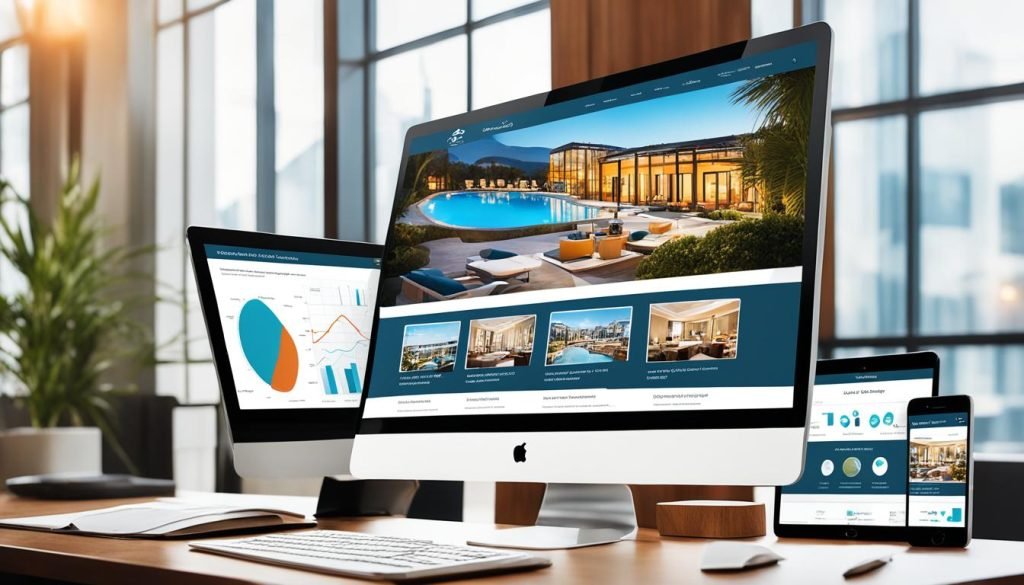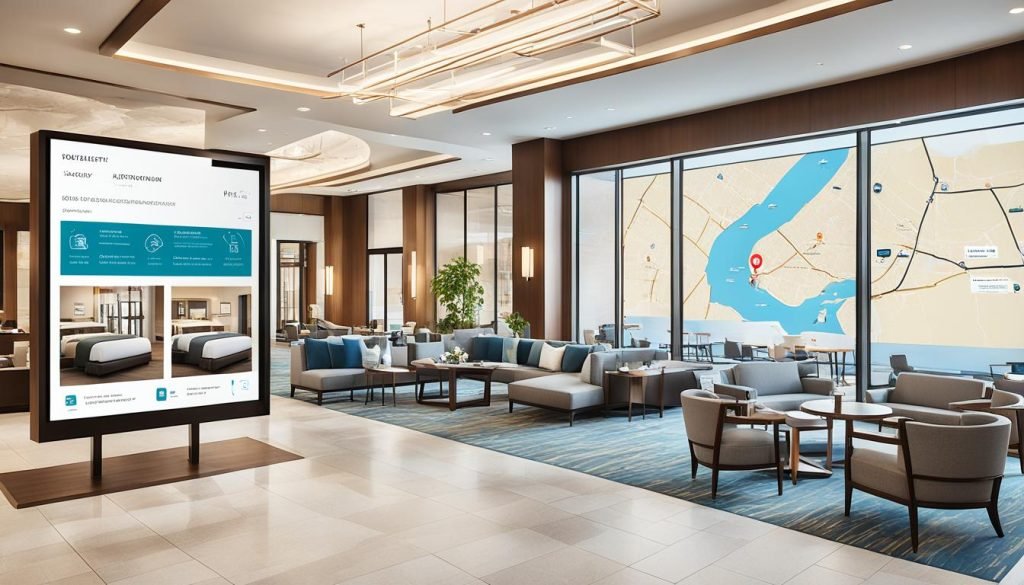Welcome to our comprehensive guide on specialized hotel web design and optimization. In today’s digital age, having an attractive and user-friendly website is key to attracting potential guests online. In this section, we will delve into the importance of hotel web design, website optimization, and the essential features that can make your hotel stand out in the competitive online landscape.
When it comes to hotel web design, it goes beyond just creating a visually appealing website. It involves strategically incorporating elements that enhance the user experience, showcase your hotel’s unique offerings, and drive direct bookings. By optimizing your website for search engines, you can improve its visibility and increase organic traffic, leading to more potential guests discovering your hotel online.
From captivating website layouts and beautiful imagery to seamless online booking options and user-friendly interfaces, every aspect of your hotel website plays a crucial role in attracting and engaging guests. By partnering with a hotel web design company that specializes in creating tailored websites for the hospitality industry, you can ensure that your website is optimized to meet the unique needs and challenges of the hotel industry.
Key Takeaways:
- Specialized hotel web design is essential for attracting guests online.
- Website optimization improves your hotel’s online visibility.
- An engaging website layout enhances the user experience.
- Effective branding creates a strong identity for your hotel.
- Optimizing your website for SEO drives organic traffic.
Tailored Website Development for Hotels
When it comes to creating a successful online presence for your hotel, generic website development just won’t cut it. Your website needs to be tailored specifically to meet the unique needs and challenges of the hospitality industry. That’s where partnering with a hotel web design company can make all the difference.
A hotel web design company specializes in creating websites that are not only visually appealing but also optimized to attract and engage your target audience. They understand the importance of creating a seamless user experience that drives direct bookings and builds trust with potential guests.
Website development for hotels goes beyond simply designing a website. It involves a comprehensive approach that takes into account factors such as user interface design, mobile responsiveness, search engine optimization (SEO), and integration with third-party booking systems.
By partnering with a hotel web design company, you can leverage their expertise and experience in developing websites specifically for the hospitality industry. They have in-depth knowledge of the features and functionalities that are vital for hotel websites, such as:
- Intuitive booking interfaces that make it easy for guests to reserve rooms.
- Integration with online travel agencies (OTAs) to maximize your reach and visibility.
- Responsive design that ensures your website looks and functions flawlessly on any device, be it a desktop, tablet, or smartphone.
Having a website that is tailored to your hotel’s unique needs is essential for standing out in a crowded online marketplace. A hotel web design company can help you create a website that not only showcases the unique features and amenities of your property but also captures the attention of potential guests and drives direct bookings.
The Benefits of Tailored Website Development for Hotels:
1. Enhanced User Experience: A website that is tailored to the hospitality industry ensures a seamless user experience, making it easy for guests to navigate, find information, and make bookings.
2. Improved Visibility: With SEO strategies and best practices integrated into your website development, your hotel is more likely to appear in organic search results, increasing your visibility to potential guests.
3. Increased Direct Bookings: A well-designed and optimized website encourages guests to book directly with your hotel, eliminating the need for costly third-party commissions.
4. Consistent Branding: A hotel web design company will ensure your website is aligned with your brand identity, effectively communicating your hotel’s unique selling points and creating a memorable online presence.
Are you ready to take your hotel’s online presence to the next level? Contact a hotel web design company today to discuss how tailored website development can help you attract more guests and boost your revenue.
Engaging Hotel Website Layout and Design
When it comes to a hotel website, the layout and design play a crucial role in creating a captivating online experience for potential guests. An engaging hotel website layout doesn’t just draw attention; it also guides visitors smoothly through the booking process. A visually appealing design that aligns with your hotel’s brand identity can make a lasting impression and encourage visitors to explore further.
One of the key considerations for an effective hotel website layout is responsive design. With the increasing use of mobile devices for travel planning, it is essential to ensure that your website looks and functions optimally across different screen sizes and devices. A responsive hotel website design automatically adapts to fit the user’s screen, providing a seamless experience and avoiding the need for multiple versions of your site.
By incorporating responsive design into your hotel website, your content will be easily accessible and visually appealing, whether guests are browsing on their smartphones, tablets, or desktop computers. This accessibility enhances user experience, encourages longer site visits, and ultimately leads to higher conversion rates.
Benefits of Responsive Hotel Website Design:
- Improved User Experience: A responsive design ensures that your website is user-friendly and optimized for various devices, enhancing the overall user experience.
- Higher Mobile Visibility: With the majority of travelers using mobile devices to search and book accommodations, a responsive design maximizes your hotel’s visibility across different platforms.
- Increased Conversion Rates: A user-friendly experience on mobile devices leads to higher conversion rates, as guests can easily navigate and complete the booking process without frustrations.
- Consistent Branding: Responsive design allows you to maintain consistent branding and messaging across all devices, reinforcing your hotel’s identity and credibility.
Investing in an engaging hotel website layout and responsive design is not only about creating an aesthetically pleasing website but also about providing an effortless experience for your guests. By ensuring that your website adapts to their devices and showcases your hotel’s unique features, you can attract and convert more visitors into loyal guests.
Captivating Hotel Website Branding
When it comes to attracting guests online, captivating hotel website branding plays a crucial role. It not only helps create a strong identity for your hotel but also allows you to stand out from your competitors. Effective branding goes beyond just a logo and colors; it encompasses the overall look, feel, and messaging of your website.
Creating a memorable brand experience starts with understanding your target audience and aligning your branding with their preferences and expectations. By consistently presenting your hotel’s unique selling points and creating an emotional connection, you can establish a positive perception in the minds of potential guests.
Visual elements play a significant role in hotel website branding. The choice of imagery, typography, and color palette should reflect the essence of your hotel and align with your brand’s personality. Whether it’s a luxurious boutique hotel or a trendy budget option, your website design should evoke the desired emotions that resonate with your target market.
In addition to visual branding, the tone of voice and messaging on your website should be consistent with your brand identity. Whether you aim to be warm and welcoming or sleek and professional, the language and communication style should reflect this. Your branding message should be communicated clearly and effectively throughout your website, from the homepage to the booking process.
Branding is essential in establishing a unique identity for your hotel and differentiating it from competitors. A captivating brand experience can make a lasting impression on potential guests and encourage them to choose your hotel over others.
Building a Brand Story
A powerful way to enhance your hotel website branding is by crafting a compelling brand story. This narrative gives your hotel a personality and allows guests to connect with your establishment on a deeper level. Your brand story should highlight your hotel’s history, values, and unique features, creating an emotional connection that resonates with your target audience.
Incorporating guest testimonials and reviews that align with your brand messaging can further enhance your hotel’s credibility and appeal. By leveraging the positive experiences of previous guests, you create a sense of trust and reliability, making your hotel more attractive to potential guests.
Consistency Across Channels
To ensure a cohesive brand experience, it’s essential to maintain consistency across all online channels. From your website to social media profiles and online listings, your branding elements should be recognizable and consistent, reinforcing your hotel’s identity at every touchpoint.
Key Elements of Captivating Hotel Website Branding
| Visual Branding | Tone of Voice | Brand Story | Consistency Across Channels |
|---|---|---|---|
| Eye-catching imagery | Clear and concise messaging | Compelling narrative highlighting hotel’s history and values | Consistent use of logo, colors, and fonts |
| Strategic color palette | Appropriate language and communication style | Incorporating guest testimonials and reviews | Reinforcing branding elements across social media and online platforms |
| Thoughtful typography | Creating an emotional connection |
Optimizing Hotel Websites for SEO
In today’s digital age, it’s crucial for hotels to optimize their websites for search engines to increase online visibility and attract organic traffic. By implementing effective SEO strategies and techniques, you can ensure that your hotel website ranks higher in search engine results, ultimately driving more potential guests to your site.
Here are some key strategies and techniques to optimize your hotel website for SEO:
- Keyword Research: Conduct thorough keyword research to identify the relevant keywords and phrases that potential guests are using to search for hotels online. Incorporate these keywords naturally into your website’s content, meta tags, headings, and URLs to improve your search engine rankings.
- High-Quality Content: Create engaging and informative content that speaks directly to your target audience. By regularly publishing high-quality content such as blog posts, travel guides, and local attractions, you can establish your hotel as an authority in the industry and attract more organic traffic.
- Page Load Speed: Ensure that your hotel website loads quickly across different devices and browsers. Slow-loading websites not only frustrate visitors but also negatively impact your search engine rankings. Optimize your website’s code, compress images, and leverage caching techniques to improve page load speed.
- Mobile Responsiveness: With the increasing use of smartphones and tablets, it’s essential to have a mobile-responsive website. Google prioritizes mobile-friendly websites in its search results, so make sure your hotel website is optimized for a seamless mobile browsing experience.
- Website Structure and Navigation: Create a logical and easy-to-navigate website structure that enables both users and search engines to find relevant information effortlessly. Use descriptive anchor texts, create sitemaps, and implement breadcrumb navigation to enhance user experience and search engine crawlability.
Effective SEO strategies can help your hotel website rank higher in search engine results, increasing online visibility and attracting more potential guests. By optimizing your website’s keywords, content, load speed, mobile responsiveness, and navigation, you can improve your search engine rankings and drive organic traffic to your site.
Case Study: The Impact of SEO on Hotel Website Traffic
An example of the power of SEO for hotel websites is The Oceanside Hotel, a luxurious beachfront property in Cornwall, UK. By implementing a comprehensive SEO strategy, the hotel saw a significant increase in website traffic and direct bookings.
| Year | Website Traffic | Direct Bookings |
|---|---|---|
| 2018 | 15,000 | 300 |
| 2019 | 45,000 | 750 |
| 2020 | 85,000 | 1,200 |
As shown in the table above, The Oceanside Hotel experienced a three-fold increase in website traffic and a four-fold increase in direct bookings within three years. This remarkable growth can be attributed to their commitment to optimizing their website for SEO, ensuring their hotel appeared prominently in search engine results.
Take Your Hotel Website’s Visibility to the Next Level
By implementing the strategies and techniques outlined above, you can optimize your hotel website for SEO and drive more organic traffic. Remember, SEO is an ongoing process, and it’s essential to continuously monitor and update your optimization efforts to stay ahead of the competition in the ever-changing digital landscape.
With a well-optimized hotel website, you can attract more guests, increase direct bookings, and establish a strong online presence in the highly competitive hospitality industry.
Essential Hotel Website Features
When it comes to creating a successful hotel website, there are certain features that are essential for enhancing user experience and driving direct bookings. By incorporating these elements into your website, you can provide potential guests with the information they need and make it easier for them to choose your hotel. Let’s explore some of the key features that every hotel website should have:
1. Easy Navigation
Ensure that your website has a clear and intuitive navigation menu that allows users to easily find the information they are looking for. An organized menu can help visitors navigate through different sections of your site, such as room types, amenities, dining options, and local attractions.
2. Engaging Visual Content
Utilize high-quality images, videos, and virtual tours of your hotel to captivate potential guests. Visual content provides a preview of what guests can expect and helps them envision their stay at your property. Include images of guest rooms, common areas, and amenities to entice visitors to book directly through your website.
3. Mobile-Friendly Design
With the increasing number of users browsing the internet on mobile devices, it’s crucial to have a responsive website design. A mobile-friendly website adapts to different screen sizes and ensures that users have a seamless experience, regardless of the device they are using.
4. Online Booking Options
Offer a streamlined online booking process that allows guests to easily check availability, view rates, and make reservations directly on your website. Incorporating a secure and user-friendly booking engine can increase conversion rates and reduce the risk of potential guests abandoning the booking process.
5. Guest Reviews and Testimonials
Displaying guest reviews and testimonials on your website can build trust and credibility. Positive feedback from previous guests can influence potential visitors’ decision-making process and encourage them to book with confidence.
6. Special Offers and Packages
Highlight any special deals, packages, or promotions directly on your website. This can entice visitors to take advantage of exclusive offers and increase direct bookings.
Creating a Compelling User Experience
When it comes to hotel web design and optimization, creating a compelling user experience is paramount. By focusing on user-friendly interfaces, fast loading times, and intuitive navigation, you can keep your guests engaged and satisfied throughout their online journey.
One of the key elements of a compelling user experience is a user-friendly interface. Ensuring that your website is easy to navigate and understand allows guests to find the information they need quickly and effortlessly. A clean and organized layout with clear headings and intuitive menus can make a significant difference in guiding your guests through the website.
Fast loading times are essential in today’s fast-paced digital world. Research shows that users have little patience for slow-loading websites, with the majority of them abandoning the page if it takes longer than a few seconds to load. Optimizing your website’s speed through compressed images, efficient coding, and fast hosting can help you provide a seamless browsing experience.
Intuitive navigation is another crucial aspect of creating a compelling user experience. Make it as easy as possible for guests to find the information they are looking for, whether it’s details about room rates, amenities, or nearby attractions. Incorporate clear and concise calls-to-action (CTAs) that guide users towards essential actions, such as booking a room or contacting your hotel.
“A compelling user experience is the key to converting website visitors into hotel guests. By prioritizing user-friendly interfaces, fast loading times, and intuitive navigation, you can enhance the overall guest experience and drive direct bookings.”
Remember, a well-designed website that caters to the needs of your guests can leave a lasting impression and set you apart from competitors. By investing in hotel web design and optimization, you can create a compelling user experience that boosts guest satisfaction and drives revenue.
User Experience: Hotel Website Performance Comparison
| Website | Page Load Time (seconds) | Mobile-Friendly | Website Rating (out of 5) |
|---|---|---|---|
| Hotel A | 2.5 | Yes | 4.7 |
| Hotel B | 5.2 | No | 3.2 |
| Hotel C | 3.1 | Yes | 4.1 |
Enhancing Online Bookings
When it comes to hotel web design and optimization, enhancing online bookings is a key objective for any hotelier. Your website should not only attract visitors but also entice them to book a stay at your hotel. To achieve this, there are several strategies you can implement to optimize your hotel website and increase conversion rates.
Persuasive Imagery
Visual appeal plays a significant role in influencing customer decisions. By incorporating persuasive imagery, you can showcase the unique features, amenities, and experiences that your hotel offers. High-quality photographs of your hotel’s rooms, facilities, and surrounding area can create a sense of desire and aspiration, encouraging visitors to make a reservation.
Remember to use alt tags for your images, ensuring they contain relevant keywords related to your hotel and its offerings. Alt tags not only help with search engine optimization but also improve accessibility for visually impaired users.
Clear Calls-to-Action
A clear and well-placed call-to-action (CTA) can significantly impact your website’s booking conversion rate. The CTA should be prominently displayed on your website, guiding visitors towards the booking process. Consider using attention-grabbing buttons with strong action-oriented language, such as “Book Now” or “Check Availability,” which compel visitors to take immediate action.
Seamless Booking Processes
A seamless and user-friendly booking process is essential for converting website visitors into paying guests. Streamline the booking journey by minimizing the number of steps required to make a reservation. Implement a user-friendly booking form that captures essential guest information without overwhelming them with unnecessary details. Additionally, highlight any special offers, discounts, or package deals that are available during the booking process to further incentivize reservations.
By optimizing your hotel website’s design and functionality to facilitate a smooth booking experience, you can encourage visitors to take the final step and confirm their reservation.
Strategies to Enhance Online Bookings
| Strategy | Description |
|---|---|
| Persuasive Imagery | Showcase the hotel’s unique features and experiences through high-quality photographs. |
| Clear Calls-to-Action | Use attention-grabbing CTAs that guide visitors towards the booking process. |
| Seamless Booking Processes | Optimize the booking journey by minimizing steps and providing a user-friendly booking form. |
Implementing these strategies can make a significant difference in driving online bookings for your hotel. By combining persuasive imagery, clear calls-to-action, and seamless booking processes, you can optimize your hotel website to convert visitors into delighted guests.
Measuring Success with Analytics
Measuring the success of your hotel website optimization efforts is crucial to understanding how well your strategies are performing and identifying areas for improvement. By leveraging analytics tools, you can gain valuable insights into the effectiveness of your website and make data-driven decisions to optimize its performance.
Key Metrics to Track
When it comes to hotel website optimization, there are several key metrics that you should track to gauge your website’s performance:
- Conversion Rate: Measure the percentage of visitors who take the desired action on your website, such as making a reservation or filling out a contact form. Tracking your conversion rate can help you assess the effectiveness of your calls-to-action and booking processes.
- Bounce Rate: Monitor the percentage of visitors who navigate away from your website after viewing only one page. A high bounce rate may indicate that your website lacks engaging content or has a poor user experience.
- Page Load Time: Assess the speed at which your website loads, as slow-loading pages can frustrate users and negatively impact your search engine rankings. Optimize your website’s load time to improve user experience and reduce bounce rates.
- Traffic Sources: Analyze where your website traffic is coming from, whether it’s organic search, paid advertising, social media, or referral links. Understanding your traffic sources can help you allocate resources effectively and identify areas to focus on for improvement.
- User Behavior: Dive deep into how users interact with your website, including which pages they visit, how long they stay, and the actions they take. This data can help you identify popular content, optimize user flows, and enhance the overall user experience.
Using Data Insights for Continuous Improvement
Once you have collected and analyzed the relevant metrics, it’s essential to use the insights gained to continuously improve your hotel website’s performance. Here are some tips for leveraging data insights to drive optimization:
“Data is only valuable if it’s actionable.”
1. Identify pain points: Pinpoint areas where your website may be underperforming, such as pages with high bounce rates or low conversion rates. Dig deeper to understand the reasons behind these pain points and brainstorm potential solutions.
2. Test and tweak: Implement A/B testing to experiment with different variations of your website elements, such as headlines, calls-to-action, or page layouts. Test one element at a time to measure its impact on user behavior and conversion rates.
3. Monitor user feedback: Pay attention to user reviews, comments, and feedback to gain qualitative insights into their experience with your website. Address any concerns or issues raised by users and make necessary improvements based on their feedback.
4. Stay up-to-date: Keep abreast of industry trends, new technologies, and changes in user behavior. Regularly update your website to incorporate the latest best practices and optimize for emerging trends.

By continuously measuring and analyzing your website’s performance through analytics, you can make data-backed decisions to optimize your hotel website for improved user experience, higher conversions, and increased online bookings.
Continuous Website Improvement
As a hotel owner or manager, it’s crucial to understand that your website is not a static entity. To ensure its success in attracting guests and driving bookings, continuous website improvement is essential. By staying up-to-date with industry trends and incorporating user feedback, you can stay ahead of the competition and maximize your online presence.
One important aspect of continuous improvement is keeping your hotel web design fresh and engaging. As technology and design trends evolve, it’s important to regularly assess and update your website’s visual appeal and functionality. By incorporating modern design elements and intuitive navigation, you can provide a seamless user experience that keeps guests engaged and encourages them to explore and book.
Another crucial factor in continuous website improvement is optimizing your hotel website for search engines. By regularly reviewing and updating your SEO strategies, you can ensure that your website remains visible to potential guests when they search for hotels in your area. This includes optimizing your website’s content, meta tags, and URLs, as well as incorporating relevant keywords and implementing effective link-building strategies.
Additionally, continuously monitoring and analyzing website analytics is vital in improving your hotel website’s performance. By tracking key metrics such as bounce rate, conversion rate, and average session duration, you can identify areas for improvement and make data-driven decisions. This allows you to refine your website’s design, content, and functionality to better meet the needs and expectations of your target audience.




